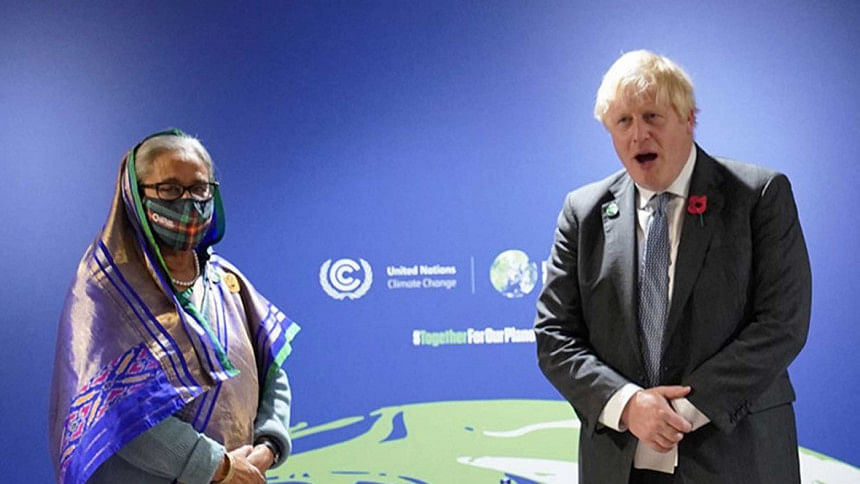Who were the true leaders at COP26?

Ever since COP26 ended, we have been bombarded with analyses on how good or bad it was. The COP26 Presidency claimed it was a great success, while the vulnerable developing countries left Glasgow in great dismay over the overturning of their demand for a "Glasgow facility" on "financing loss and damage". They only got a promise to hold a "dialogue" on the issue, so the battle will go on to COP27 next year, which will be hosted by Egypt in Sharm El-Sheikh in November 2022.
I will not repeat what has been reported by the global media on the actual agreements in the final Glasgow decision, but I will say that they are all very weak and pedestrian and nowhere near being adequate to face the scale of the climate emergency at hand. To give one example, the Climate Vulnerable Forum (CVF) countries at the beginning of the COP demanded that the outcomes be named the Glasgow Climate Emergency Pact. In the end, the COP Presidency chose to call the outcome of COP26 the Glasgow Climate Pact, dropping the word emergency both in name as well as in substance.
I will focus my post-COP26 column not on the content of the discussion but on the personalities who stood out to me while I spent the last three weeks in Glasgow. Incidentally, they are all women.
The first person that I want to flag is a young activist from Uganda named Vanessa, who has been raising the issue of climate change in her own country every Friday as part of the Fridays for Future movement of school kids. She was recently on the cover of Time magazine and was in Scotland attending and speaking at numerous events both inside as well as outside the Blue Zone of the COP26 venue.
I had the opportunity to share the platform with her on several occasions and was extremely impressed by her sincerity and maturity which was beyond her young years. In my mind, she is emblematic of where the future lies in the movement to tackle climate change. The youth of this world, collectively, will become the agents of change as their elders have let them down time and again. The youth movements around the world are already moving from mere protests to real actions in global solidarity that have much greater potential for doing good than a hundred COPs.
The second leader I would pick was, in fact, our host in Scotland, namely the First Minister of Scotland, Nicola Sturgeon. While Scotland is not a party to the United Nations Framework Convention on Climate Change (UNFCCC), it nevertheless has its own Climate Justice Fund, which it decided to double just before the start of COP26. A number of civil society groups in Scotland and elsewhere lobbied with her to use some of it to start a "loss and damage fund". Just before the start of COP26, Nicola Sturgeon announced a one million pounds contribution to a new loss and damage fund and challenged other world leaders to contribute more to it. By the end of the COP, she doubled the amount from Scotland and also received contributions from Walloon province in Belgium and a number of philanthropic foundations, taking the fund to well over USD 5 million—and we expect more contributions to come in soon.
First Minister Nicola Sturgeon very kindly invited me to have tea with her at her residence in Edinburgh the day after COP ended to discuss how we can take this initiative further in the coming year to COP27. She remains fully committed to our cause of climate justice and has shown herself to be a true leader.
The third and final leader I will highlight is Prime Minister Sheikh Hasina, who attended the first two days and spoke not only on behalf of Bangladesh, but for 55 developing countries who are part of the CVF which she currently chairs. She presided over a meeting of the CVF leaders who were in Glasgow and they all declared their intentions to develop their own climate prosperity plans modelled on the Mujib Climate Prosperity Plan (MCPP) of Bangladesh. The CVF countries are changing their narrative from victims to global leaders in tackling climate change and asking other countries to follow their lead. Prime Minister Sheikh Hasina was well-recognised as such a global leader during COP26.
My final verdict on COP26 was that we had both a bad COP in terms of the failure to get the Glasgow facility on financing loss and damage inside the Blue Zone of the negotiations, but we also had a very good COP outside the Blue Zone with tens of thousands of youth, indigenous people, scholars, businesses, mayors, parliamentarians and many others who came to network and join forces for action—and not blah, blah, blah. Together with the hospitality of the people of Glasgow and Scotland, that made us all feel that we had indeed attended a very good COP.
Dr Saleemul Huq is Director of the International Centre for Climate Change and Development and Professor at the Independent University Bangladesh.

 For all latest news, follow The Daily Star's Google News channel.
For all latest news, follow The Daily Star's Google News channel. 



Comments